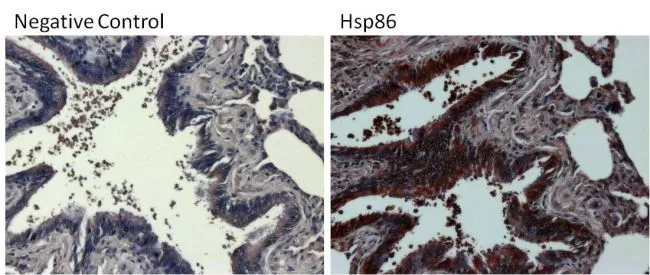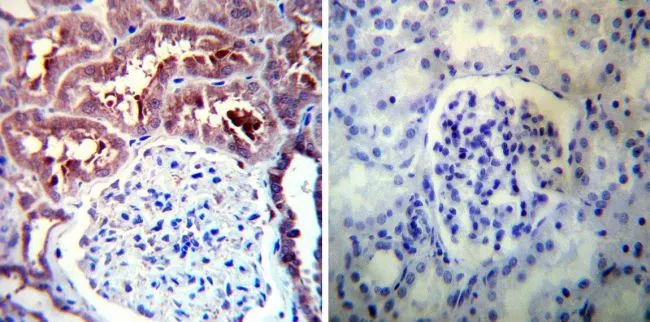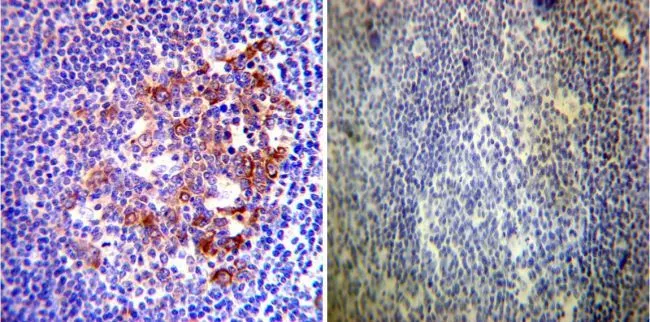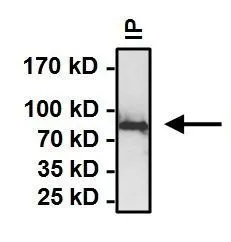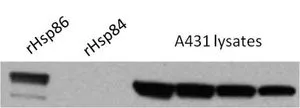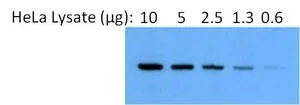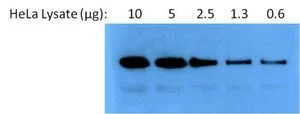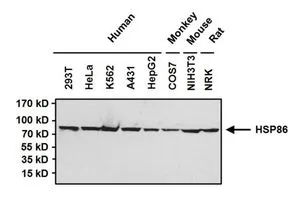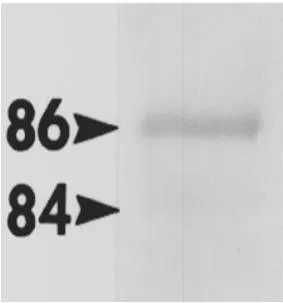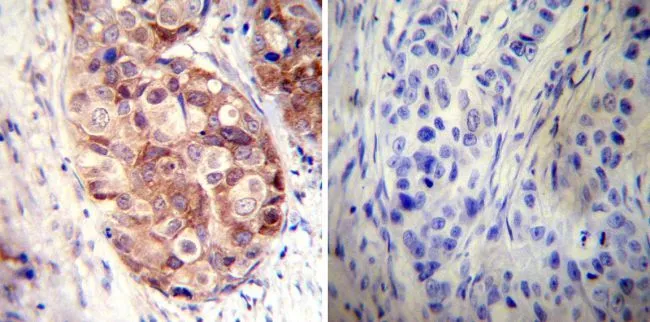
IHC-P analysis of human breast carcinoma tissue using GTX22928 Hsp90 alpha antibody. Left : Primary antibody Right : Negative control without primary antibody Antigen retrieval : heat induced antigen retrieval was performed using 10mM sodium citrate (pH6.0) buffer, microwaved for 8-15 minutes Dilution : 1:50
Hsp90 alpha antibody
GTX22928
ApplicationsImmunoFluorescence, ImmunoPrecipitation, Western Blot, ImmunoCytoChemistry, ImmunoHistoChemistry, ImmunoHistoChemistry Paraffin
Product group Antibodies
ReactivityHuman, Mouse, Primate, Rabbit, Rat, Sheep
TargetHsp90aa1
Overview
- SupplierGeneTex
- Product NameHsp90 alpha antibody
- Delivery Days Customer9
- Antibody SpecificityThis antibody does not detect HSP84.
- Application Supplier NoteWB: 1:500 - 1:2000. ICC/IF: 1:50-1:200. IHC-P: 5 microg/ml. IP: 2 microg. *Optimal dilutions/concentrations should be determined by the researcher.Not tested in other applications.
- ApplicationsImmunoFluorescence, ImmunoPrecipitation, Western Blot, ImmunoCytoChemistry, ImmunoHistoChemistry, ImmunoHistoChemistry Paraffin
- CertificationResearch Use Only
- ClonalityPolyclonal
- Concentration1 mg/ml
- ConjugateUnconjugated
- Gene ID15519
- Target nameHsp90aa1
- Target descriptionheat shock protein 90, alpha (cytosolic), class A member 1
- Target synonyms86kDa; 89kDa; AL024080; AL024147; heat shock 86 kDa; heat shock protein 1, alpha; heat shock protein 90kDa alpha (cytosolic), class A member 1; heat shock protein HSP 90-alpha; heat shock protein, 1; heat shock protein, 86 kDa 1; heat shock protein, 89 kDa; hs; Hsp; HSP 86; hsp4; HSP86; Hsp86-1; Hsp89; Hsp90; Hspca; TSTA; tumor-specific transplantation 86 kDa antigen
- HostRabbit
- IsotypeIgG
- Protein IDP07901
- Protein NameHeat shock protein HSP 90-alpha
- Scientific DescriptionHeat shock proteins (HSP) are expressed in response to various biological stresses, including heat. HSP90 is a 90 kDa protein that is induced under stress conditions, but is also one of the most abundant cellular proteins found under non-stress conditions. HSP90 has been found to be associated with a number of other intracellular proteins, including steroid receptors, actin, tubulin, Ah receptor, and some kinases. Studies have shown that murine HSP90 exists as two forms, HSP84 and HSP86, coded by related but separate genes, with 86% homologous amino acid sequences. These forms are analogous to the two forms of human HSP90, HSP89 beta and HSP89 alpha. In an unstressed mouse fibroblast, the basal level of HSP84 is found to be double that of HSP86. However, after heat shock, HSP86 shows a greater increase. Studies also suggest that upon cellular differentiation, the level of HSP86, but not HSP84, decreases. HSP84 and HSP86, which may be subject to estrogenic regulation, have been found as components of the non-DNA binding form of mouse glucocorticoid receptor, but dissociated from the transformed DNA-binding form.
- ReactivityHuman, Mouse, Primate, Rabbit, Rat, Sheep
- Storage Instruction-20°C or -80°C,2°C to 8°C
- UNSPSC12352203

